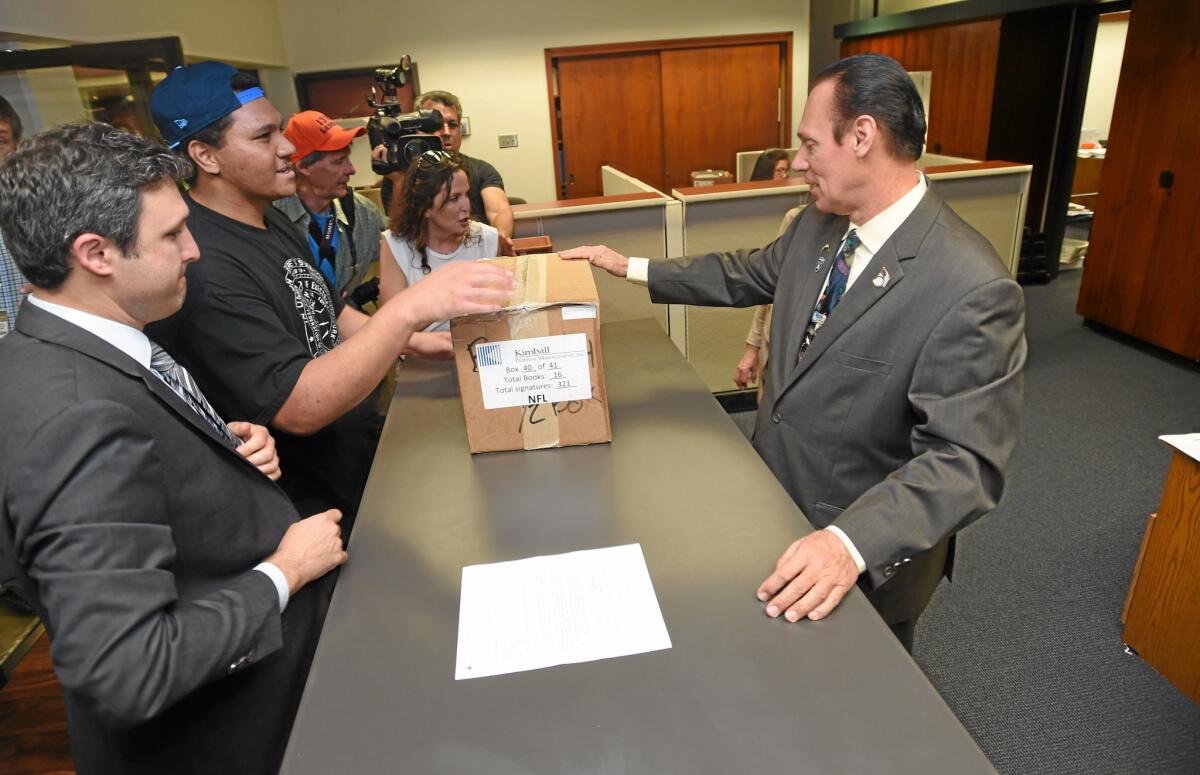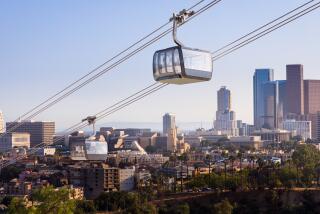Op-Ed: Lack of transparency on NFL stadium proposals

The decision to put NFL stadium proposals on the ballot, first in Inglewood and now in Carson, may seem noble. After all, at the center of our democracy is the right of the people to vote. But this maneuver is not about letting the public have a say; it’s actually a shortcut to avoid public scrutiny and California’s environmental laws — as became clear when the Inglewood City Council chose to bypass the electoral process and approve a stadium directly. It doesn’t take much imagination to see that the Carson City Council and the developer there will do exactly as Inglewood did — an electoral and environmental bait and switch.
Why should anyone care? Another idea central to democracy is that the people need access to information, without which they can’t make educated decisions. For more than four decades, the California Environmental Quality Act has required projects large and small to include full disclosure of environmental impacts on traffic, air quality, noise and safety. It has been instrumental in shaping projects for the betterment of the people who live or work near those proposed projects.
Just as significant, the law has been an important step in eliminating backroom deals where the public is kept in the dark only to find out about important decisions after the fact. It’s no coincidence, therefore, that there is a lack of transparency in the dealings between Inglewood and Carson officials and the would-be developers of NFL stadiums in those cities.
Unfortunately, the California courts have held that most ballot measures are exempt from the environmental quality act. And, recently, the California Supreme Court held that this outright exemption applies if the City Council itself approves a project that has qualified for the ballot.
Inglewood’s City Council deprived its people not only of the ability to control what will happen in their community, but also the ability to know what exactly will befall them. To stay in the race with Inglewood for a new stadium, Carson’s City Council is likely to give its residents the same treatment.
Common sense tells us that a project as large as an NFL stadium would dramatically influence the quality of life in nearby neighborhoods and the entire region.
In Inglewood, for example, parking at LAX and even flight operations are likely to be affected. In Inglewood and Carson, the developers would get special treatment on noise regulations and parking requirements. The Carson initiative provides the right to have the equivalent of 100 billboards — one for every yard on the field — but they won’t be inside the stadium, they will be along the freeway and adjacent to the surrounding community.
What’s happened in Inglewood and what may happen in Carson is by no means standard. The developers behind other stadium proposals in the region prepared full environmental impact reports. For the stadium project in downtown Los Angeles, at least 12 impact categories were analyzed and vetted with hundreds of traffic and other mitigation measures imposed.
It is entirely disingenuous, if not downright offensive, to suggest that the cursory report prepared in Inglewood would provide anything remotely approaching the comprehensive environmental review that should occur before public officials irreversibly greenlight a major development. It was put together in less than a month by the developer’s handpicked consultant.
Carson is playing the same game by hiring consultants to justify its project.
The California Legislature should address whether ballot measures should be exempt from environmental review. For Inglewood, and for Carson if its City Council pulls the same bypassing stunt, the only way to rectify the situation is to challenge the direct approval by referendum.
But that’s a ridiculously burdensome and rather ironic way to make things right. When developers in Inglewood and Carson solicited signatures for ballot measures, they promised a vote. Now the people of Inglewood and Carson may have to hold a referendum just to get the opportunity to vote that they expected all along.
The voters in Inglewood were bypassed. The voters in Carson should be wary. And citizens throughout the state of California should be concerned that this might happen to them.
If a massive project, such as a stadium, can be approved with this ploy, developers and City Councils will read the Inglewood-Carson playbook for a wide range of other environmentally damaging projects. And those communities will be shut out of the decision-making process.
David Pettit is a senior attorney at the Natural Resources Defense Council.
Follow the Opinion section on Twitter @latimesopinion and Facebook
More to Read
A cure for the common opinion
Get thought-provoking perspectives with our weekly newsletter.
You may occasionally receive promotional content from the Los Angeles Times.






